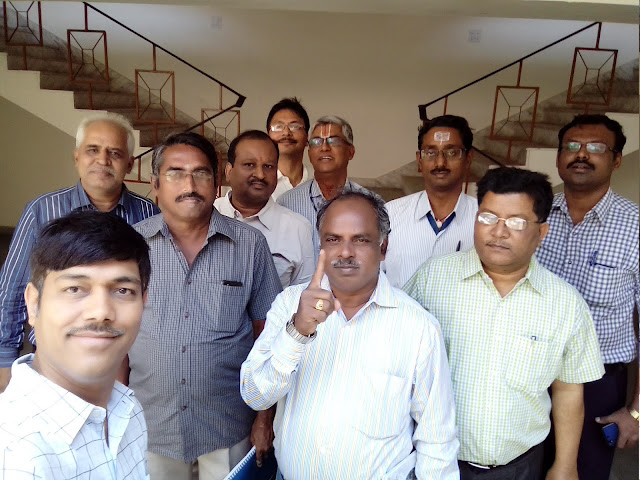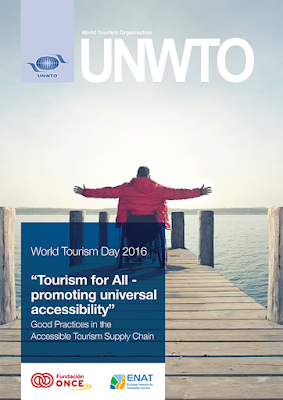
CABE Foundation is a non-profit initiative advancing accessibility, universal design, and disability inclusion through advocacy, research, consultancy, and capacity building. We drive policy reform, formulate standards, conduct accessibility audits, and promote inclusive practices across education, employment, tourism, travel, technology, and stakeholder training—aligning with the UN CRPD and SDGs.
Tuesday, September 27, 2016
India takes strides to make world heritage sites accessible on this World Tourism Day
Sunday, August 28, 2016
Smart Cities missing out on Accessibility & Inclusivity
Smart Cities missing out on Accessibility and Inclusivity
“While the entire smart cities (project) is data- driven project, there is no data on accessibility. Since there is no data, there is very less likelihood of including it into the indicators," said, Subhash Chandra Vashishth
Express News Service, Ahmedabad 28th Aug 2016
Leading experts from various sectors batted for the government to have more accessibility and inclusivity indicators in the Smart Cities Mission at the National Conclave on Universal Design & Accessibility (UD &A) in Smart Cities, organised by the Indian Institute of Management-Ahmedabad Saturday.
Speaking on the sidelines of the conclave, Subhash Chandra Vashishth, lawyer and founder of CABE, said, “While the entire smart cities (project) is data- driven project, there is no data on accessibility. Since there is no data, there is very less likelihood of including it into the indicators. Accessibility is actually still not on the agenda of smart cities, that’s what we have seen in our experience. It’s on automation, on getting smart technology — but not planning the environment keeping the last link — the weakest and most vulnerable person in mind. Unless that happens, this is not sustainable and we may have to end up redoing it in the future. So far we have been looking at accessibility as a charity and talking in terms of percentages, but we have not been benchmarking it.” He added that accessibility reforms will be brought in with the NBC (National Building Code) 2016.
“The IT infrastructure currently employed in corporates and banks etc that is usable by mainstream needs to be usable by all, which is where the gap really lies. For example, if you use a software in a bank, its usability by a blind person is not taken into consideration. And what it leads to is that no blind person is then placeable in that bank. Secondly, there are certain key building blocks for IT infrastructure and accessibility. One of them is this text to speech technology and it doesn’t work for us in Indian languages despite India becoming an IT hub of the world. Lots of research is happening through labs, but different models need to be brought in,” said Dipendra Manocha, managing trustee, Saksham Trust.
“The entire framework for smart cities is looking at how to provide IT infrastructure that is smarter, but who are the people going to use it? Especially children, old people, women etc, and people with disabilities who are not that smart. People creating these smart cities should also look at what unsmart people we are planning for in terms of programme, plan, delivery accessibility and usage. The smart cities mission misses out on the accessibility and inclusivity bit as many people who are not IT savvy, economically backward,” said Anjlee Agarwal, executive director, Samarthyam.
Source: Indian Express
Saturday, August 27, 2016
CABE contributed to the Universal Design Conclave & Accessibility Conclave at IIMA on 27 Aug 2016
 |
| Conclave Welcome Banner |
Dear Colleagues,
The Indian Institute of Management-Ahmedabad (IIMA) organised a Conclave titled "National Conclave on Universal Design and Accessibility, Smart Cities & Digital India" on August 27, 2016 at PP Gupta Auditorium, IMDC, New Campus, Indian Institute of Management(IIMA), Vastrapur, Ahmedabad, Gujarat, India.
This conclave was an initiative to generate awareness about the concept of "Accessibility or Design for All" which focuses on designing buildings, products and environments that are inherently accessible to people with disabilities, older people and also people without disabilities. It was organised in co-operation with the Ministry of Social Justice and Empowerment, Government of India, and with Blind People’s Association (BPA), as research partners. The Conclave was very well moderated by Prof. Ashis Jalote Parmar, an information architect & design thinker, one of the dynamic & able professors that IIMA has on its rolls.
 |
| Mr. Subhash Chandra Vashishth with Dr. Ashis Jalote Parmar |
 |
| Mr. Subhash Chandra Vashishth speaking at the Conclave |
 |
| Mr. Subhash Chandra Vashishth taking questions of participants |
Mr. Vashishth also shared that while Accessible India Campaign was a very good initiative of Hon'ble Prime Minister Sh. Narendra Bhai Modi and that it has brought focus back to the basic accessibility challenges facing the nation, its reach is still limited to cities that too only a certain number of public buildings. Rural India is still beyond reach of the campaign and we all know over 65% of population resides in villages which includes a significant population of elders & those with disabilities.
He also expressed that with over-emphasis on the technology in the smart cities, the "compassion" has taken a back seat. He advocated "Smart & Compassionate Habitats" instead of "Smart Cities" as Cities left out so many Indians from reaping the fruits of development and it was also a cause of lop-sided development & reason for mass exodus of rural population to cities & suburbs leading to socioeconomic, psychological & medical complexities.
"Accessibility is actually still not on the agenda of smart cities, that’s what we have seen in our experience. It’s on automation, on getting smart technology — but not planning the environment keeping the last link — the weakest and most vulnerable person in mind. Unless that happens, it will not be sustainable and we may have to end up redoing it in the future in form of retrofitting. So far we have been looking at accessibility as a charity, add-ons and talking in terms of percentages, but we have not been bench-marking it.” he said.
He raised concern on the huge gap between the legal requirements & actual compliance when it came to accessibility of buildings, transport infrastructure, services, websites & ICT infrastructure. He stressed that systemic changes were needed to capture the data on accessibility so that it could be reflected in the budgetary plans & schemes and in the 100 smart cities that India is poised to achieve. He added that new revisions brought out by the Bureau of Indian Standards in the National Building Code 2016- wherein he authored the entire chapter on accessibility provisions- contain comprehensive requirements on Accessibility based on Universal Design.
Other important speakers included Senior representatives from Accessible India Campaign (Ministry of Social Justice & Empowerment), Skill India, Digital India (Ministry of Electronics & Information Technology), Municipal Commissioner Ahmadabad, Mastek India, Centre for Internet & Society- Bangalore, Saksham- New Delhi, Samarthyam- New Delhi, School of Planning & Architecture, Bhopal etc. The participants included design professionals, architects, engineers, academicians from National Institute of Design, DPOs, Govt. Officials from ULBs & Smart City Project & other stakeholders.
Here are some more pictures from the Conclave.
 |
| Mr. Deepinder Singh, Head Strategy Digital India, Speaking |
 | ||
| Mr. Sanjay Singh, Under Secy, Accessible India, speaking |
 |
| Dr. Parmar introducing Dr. Rachna Khare, SPA Bhopal |
 |
| Municipal Commissioner Ahmadabad speaking |
 |
| Mr. Vashishth with other speakers |
 |
| Mr. Kumar Manish, Founder Urban Voices, raising a query |
 |
| Conclave Hall at IIMA full of participants |
Saturday, August 06, 2016
Indian Case study by CABE finds a place in 6 Best Practices included in UNWTO's Theme Brochure for World Tourism Day 2016
- Accessible Heritage Tourism: Best Practices of Universal Accessibility in India: Adapting sensitive cultural monuments to enable all visitors to enjoy cultural heritage sites;
- Exhibition of 3-D copies of Works of Art from the Prado Museum's Collection, Spain: Use of new technologies to make art accessible for visitors with visual impairments;
- Everyone Belongs Outside: Push to Open Nature & the Alberta Parks Inclusion Plan, Canada: Inclusion of often-excluded groups of visitors, such as persons with reduced mobility and learning difficulties, in outdoor environments;
- Barrier-free Tour Center, Japan: Application of accessibility-improvement measures and Universal Design to achieve access in urban planning and buildings through advocacy groups working with public and private sector;
- Lonely Planet Accessible Travel Guide: Availability of accessibility information; and
- T-GUIDE: Guiding Visitors with Learning Difficulties: Vocational training course on guiding visitors with intellectual impairments or learning difficulties at cultural heritage sites.
Ever since its inception, World Tourism Day is celebrated on 27 September to foster awareness among the international community of the importance of tourism and its social, cultural, political and economic value. As the official day set aside in the United Nations Calendar the celebration seeks to highlight tourism's potential to contribute to reaching the Sustainable Development Goals (SDGs), addressing some of the most pressing challenges society is faced with today.
Tweet with hashtags #tourism4all #WTD2016 #CABEIndia #CABEFoundation #UNWTO
Thursday, June 02, 2016
Singapore BCA's Universal Design Mark 2016 Award for Inclusive Design to 25 projects
- Improves competitiveness by meeting the varying needs of diverse user groups
- Increase in the number of potential visitors to the development, thereby, generating greater sales and revenue
- Generates a positive effect on the corporate image
More about SkyVille's housing project : First batch of SkyVille at Dawson residents receive their keys
Wednesday, April 13, 2016
3rd Batch of Access Auditor Training at National CPWD Academy by CABE (11-13 Apr 2016)
 |
| Batch III - Training Course on Accessible India Campaign |
 |
| Group I of Batch 3 conducting access audit indicating their group |
 |
| Group III of Batch 3 conducting access audit indicating their group |
 |
| A group of Trainees after the Physical Access Audit |
 |
| Trainees appearing in the Written Assessment Test post the Access Audit Training |
 |
| Group Photo of Batch III Trainees at National CPWD Academy. This photo is also available in higher resolution PDF File on CPWD Website link: http://cpwd.gov.in/WriteReadData/training_cir/20749.pdf |
Stay tuned for regular updates by subscribing to this website and visiting us on Facebook Page: CABE Foundation
Saturday, April 09, 2016
CABE conducts 3-day Access Auditor Training for CPWD (2nd Batch) 7-9 Apr 16
 |
| Batch II of Access Audit Training |
 |
| Group I of Batch II doing Access Audit |
 |
| Group II of Batch II doing Access Audit |


